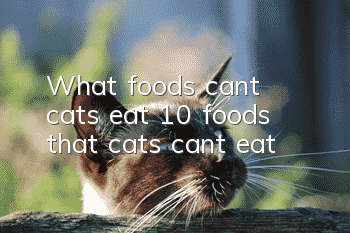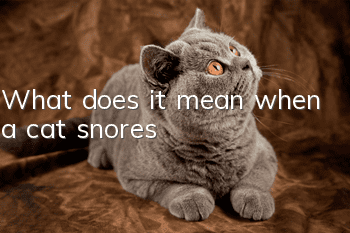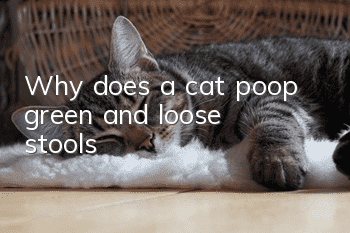What foods can’t cats eat? 10 foods that cats can’t eat

Some people pamper their cat owners in every possible way, but little do they know that they are actually causing harm to their cat’s health in disguised form. Therefore, today, the editor will give you some popular science about the foods that cats cannot eat:
Some cats are greedy. They want to eat whatever people eat. They think it smells good when they see you eating it, and they think it must be delicious. If you feed it, it will eat it. But if you do this for a long time, it will gradually damage your cat's health.
Therefore, we need to make an analysis among the things that humans can eat, and pay attention to which things cannot be given to cats, which things cannot be given to cats to eat at will, and which things cannot be given to cats to eat in large quantities. This is common sense that cat owners must master.
1. Onions/scallions
Onions contain ingredients that can destroy your cat’s red blood cells. Although you won’t feed onions alone, be careful not to mix them with meat.
2. Internal organs
This is a commonplace saying. It is most likely to cause skin problems in pets, such as eczema, dandruff, itchy skin and other problems. The same is true for cats. Overeating offal (such as chicken liver) can cause vitamin A poisoning and bone problems in cats. Therefore, give them their favorite liver only after a long period of time to change the taste.
3. Fish bones and chicken bones
Some people think that cats can chew bones well, but in fact cats do not chew food, but swallow it. There is a risk of piercing the stomach due to fish bones, so it is safer to remove them. Moreover, fish bones contain calcium and phosphorus, which may cause urinary tract stones in cats if consumed for a long time.
The bones of birds and other poultry animals are relatively hard. When cats bite them, they will produce some sharp fragments. These fragments can sometimes puncture the cat's mouth or internal organs. Therefore, to prevent cats from eating these bones, a common method here is to use a pressure cooker. The bones are stewed until softened or crushed and added to the feed.
4. Dried fish
Sun-dried fish contains a relatively large amount of magnesium, which can easily induce and cause urethral stones or urinary system diseases in cats, so try to let cats eat less. An adult cat needs about 0.3 to 0.5 grams of salt a day. Be careful not to eat too much salt in the cat's feed.
5. Human food
Our meals contain a lot of oil, salt and other condiments, and some even contain a lot of spices, which are not suitable for pets.
An adult cat or dog only needs to eat food with 5% salt content. Too much oil and salt is not good for their health. Spicy meat is even more unacceptable. Spicy meat will dull the cat’s sense of smell and cause intestinal irritation.Stomach discomfort. For example, cats are willing to eat the most common fried chicken and barbecue, but don’t give it to them.
6. Ice cream, cream cake + dessert
In fact, there is no need to give ice cream, cream cakes, snacks, rice dumplings, etc. to pets. Some contain too much sugar, some are not easy to digest, and can easily cause obesity or diarrhea. In short, they have a great impact on the gastrointestinal tract of pets. .
7.Chocolate
Theobromine contained in chocolate can cause food poisoning. Chocolate poisoning can cause vomiting and diarrhea, frequent urination, hyperactivity, accelerated heartbeat and breathing, and even death due to loss of cardiovascular function. Be careful!
8. Milk + raw protein
In fact, many cat owners know that feeding cats milk is not a good thing, but they think that only milk can provide cats with rich nutrition.
The lactose content in milk is much higher than that in cat milk. Cats’ bodies lack an enzyme that breaks down and digests milk. Cats’ intestines and stomach often suffer from diarrhea because they cannot absorb the enzymes in milk.
Especially young cats, remember not to feed them milk. However, goat milk or yogurt at room temperature (the temperature cats like is between 30 and 40 degrees Celsius) can be fed. This is the same as the reason why some people cannot drink milk but can drink yogurt.
Never feed cats raw egg whites. Raw egg whites contain an antibiotic protein that neutralizes important vitamins in cats, making them unable to absorb the vitamins. Note! Neither cooked eggs nor raw egg yolks have the above problems.
9. Raw meat
Raw fish and raw meat are not allowed to be eaten. Eating uncooked fish can cause cats to be deficient in vitamin B1, because raw fish produces an enzyme that destroys vitamin B1. Lack of vitamin B1 in cats may lead to cramps, heart disease, and intermittent shock.
In addition, feeding raw fish to cats will also cause unnecessary parasite trouble, which will cause trouble in the lives of you and your cat. The Animal Hospital of Agricultural University has treated many cats with liver disease because they ate raw fish and were infected with parasites, causing systemic jaundice and hepatitis. Liver disease can also lead to liver ascites and kidney disease, and these are definitely terminal illnesses for cats.
Raw meat contains a large number of parasites (taenia, roundworm, Toxoplasma gondii, etc.), which are harmful to cats and humans.
10. Seafood
There are many seafood that cats love to eat, but they cannot be fed to cats, such as shrimp, crab, squid, cuttlefish, octopus, sardines, and horsetail fish. Because the protein in this type of food is not easily digested by cats, and it also containsThere are toxins that cause allergies in cats.
Big cats are more adaptable to this type of food, but eating too much will still cause symptoms such as allergies, salivation, vomiting, diarrhea, etc. In the case of kittens, severe cases may even cause convulsions and death. Sardines and horsetail fish in particular contain a strange toxin to which cats react particularly strongly.
However, cats especially like this kind of food because of its strong fishy smell, and so do humans. Therefore, if there are high-quality seafood during our meals, we must not feed them to cats just because they are begging for food. Even adult cats can only feed a little bit, and don't cause pain to the cat because of your pampering.
The meat of squid, squid and some shellfish contains some ingredients that cats are not adaptable to. Eating too much can cause indigestion and gastrointestinal disorders in cats. Dried squid will absorb water and expand after entering the cat's stomach, so cats should not eat too much. Some seafood can also cause skin inflammation in cats. Let the cat eat a small amount before feeding, and only give an appropriate amount if there is no reaction.
- How to treat jaundice in cats
- Cat's hair is mixed with white dander
- What should I do if my cat gets angry?
- Can cats eat kiwi fruit?
- What are the causes of autism in cats?
- How to raise British shorthair cats?
- Why doesn't the kitten eat?
- How to raise Siamese cats? Basic knowledge of raising Siamese cats for beginners!
- How to prevent cats from getting leukemia, poop owners should pay attention!
- What should I do if my cat is allergic to cat food?



